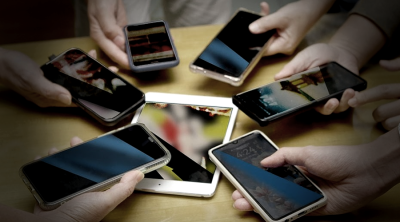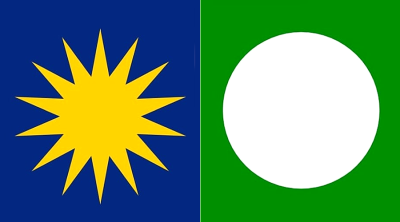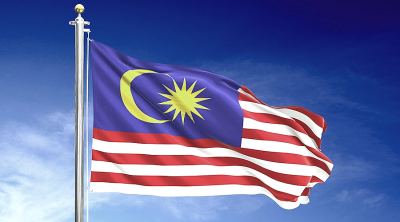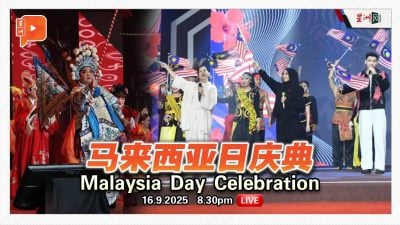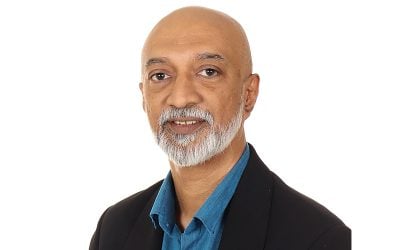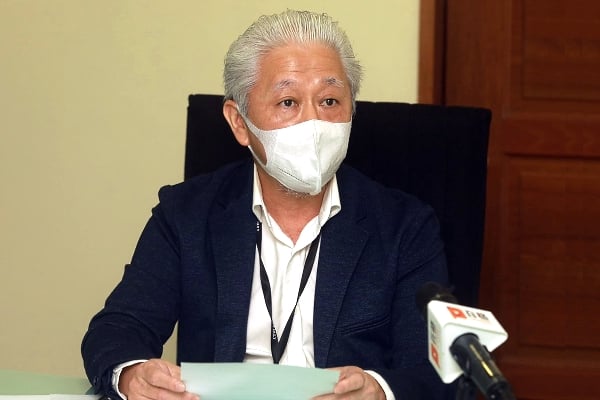
Rising in the morning, we will be ushering in the 58th Malaysia Day.
In the past, people living in West Malaysia used to celebrate only the August 31 Merdeka Day, and they hardly had any feeling for their compatriots across the South China Sea.
But to people living in East Malaysia, August 31 is at best only the independence day for Malaya or Peninsular Malaysia, as well as Sabah’s self-government day.
September 16 Malaysia Day should be the big day to be celebrated by everyone in this country!
The seat of administration centered in West Malaysia has for so many decades ignored the feelings of East Malaysians, and Malaysia Day only started to get the federal government’s attention after West Malaysian politics plunged into a mess and East Malaysians’ votes and support were sought.
In other words, thanks to a shift in the country’s political environment, East Malaysia has seen itself rising as a more recognized stakeholder of this nation.
Talking about this unique opportunity that has altered the political ecosystem of West Malaysia, we cannot go without mentioning the late Sarawak chief minister Adenan Satem.
Some of Adenan’s most powerful quotes remain deeply etched in the minds of many Malaysians to this day. Among them:
“I feel sick of the federal government’s education policy. Sarawak cannot keep following West Malaysia’s education policy. Being in a union doesn’t mean unity, and diversity can unite the people too.”
“Sarawak’s position is very consistent. We will never allow Hudud to be implemented here.”
“I don’t just want a Malay government, nor a Dayak government. All I want is a government that represents all ethnicities.”
“I told the prime minister it is up to you if UEC is not recognized in West Malaysia, but we want it over here in Sarawak.”
“Independent high schools are not just for Chinese students. There are plenty of non-Chinese students opting to study there. Many rural Malays and bumiputras are eager to send their children to these schools.”
“The Chinese are not pendatangs in Sarawak, although some foolish guys in West Malaysia call them so. These people should go to hell!”
“This is the time for the Chinese to make a decision whether they want to be a part of the Sarawak government and participate in the state’s operation, or just vent their anger outside the government. They have to make a choice. I will not be happy if there is no Chinese representation in my government.”
“Although I am doing my utmost to fight for Sarawak’s lost sovereign rights, that does not mean we are fighting for Sarawak’s independence. Secession from Malaysia is utterly stupid.”
“Christians can freely use the word ‘Allah’. I have no objection to it, and I won’t allow religious fanatics to come into Sarawak and sabotage our religious and racial harmony and solidarity.”
Adenan did not need a lot of impressive political slogans. He walked the talk in preserving East Malaysia’s culturally diverse environment.
When asked who they are, people in East Malaysian will tell you: I’m from Sandakan, or I’m from Sibu, or I’m from Kuching. Anyone who has visited the two East Malaysian states and has patronized a local coffee shop can tell that Muslims are often seen sharing the same table with the Chinese, and won’t mind if you are eating pork in front of them.
People in East Malaysia spontaneously embrace one another’s languages, cultures and cuisines, and this is very much reflected in their day-to-day living.
By right, the depth of interracial integration should be the most natural portrayal of people in this country, a quality that is sadly most lacking in our politicians right now.
When asked who you are, people in West Malaysia will invariably reply: I’m Chinese, I’m Malay, or I’m Indian. No one will straight away tell you something like: I’m from Muar.
Ironically, we will tell people that we are Malaysians only when we are outside this country.
From the colonial times to the 60-year rule by Umno, the various peoples of this country had been subjected to the “divide and rule” policy for decades. People from different ethnic backgrounds sharing a meal at a coffee shop has since become a distant memory of our grandfathers.
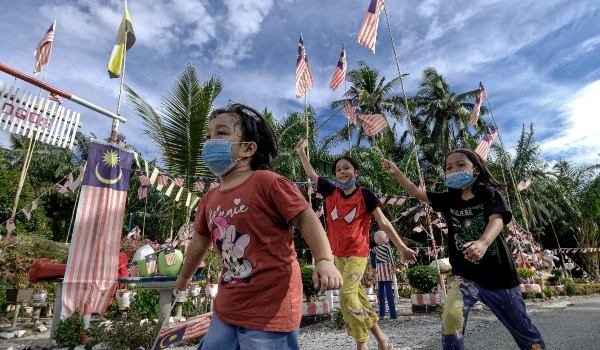
For the past so many years, in order to win the so-called traditional Malay support, Umno leaders have never ceased playing up racial politics and religious sentiments, often at the expense of the interracial harmony, unity and national identity that we are supposed to cherish for more than six decades.
To reverse the negative perceptions among people they had hurt so much in the past, some of these leaders who later managed to ascend to high offices started to introduce slogans tied to being “Malaysians”.
For example, Anwar Ibrahim suffered very bad reputation in the local Chinese community over the dispatch of non-Chinese senior staff to SJKCs and the mass arrests and closure of Sin Chew Daily and two other newspapers during Operasi Lalang while he was the education minister way back in 1987. As such, after he was appointed deputy PM by Tun Mahathir later om, he coined the “We are Family” slogan.
At the height of tension during Operasi Lalang, then Umno Youth chairman Najib Razak was leading a massive protest at Jalan Raja Muda stadium in KL in a show of force on October 17, 1987. Banners with racist slurs were said to have been used at the rally. When answering a question from the late DAP leader Karpal Singh at a parliamentary sitting later, he squarely denied having issued any racist remark.
And when he became the country’s sixth prime minister, he even championed the famous “Satu Malaysia” slogan!
In the racially charged aftermath of a mobile phone theft at the city’s Low Yat Plaza in 2015, then rural and regional development minister Ismail Sabri Yaakob infuriated many local Chinese with his irresponsible remarks. And soon after he became the country’s ninth prime minister, he came up with the heartwarming “Keluarga Malaysia” slogan.
Among the so many PMs we have, only Tun Mahathir and Tun Abdullah created slogans associated with the country’s development. Sure enough Tun Mahathir had plenty of slogans throughout his long years of premiership, the most talked about being “Bersih, Cekap, Amanah” when he was still new in office in 1982, followed by the “Look East” policy, “Wawasan 2020” (during BN time) and more recently “Shared Prosperity Vision 2030” (during PH time).
As for Tun Abdullah, he is best remembered for his “Cemerlang, Gemilang dan Terbilang” slogan.
I’m sure all our Umno leaders appreciate the beauty of this country’s ethnic, cultural and religious diversity which forms the cornerstone for the nation’s forward thrust. In view of this, these leaders have resorted to conceiving all sorts of spirit-lifting slogans to whitewash their poor public images.
Although it is never too late to make amends, such missteps should have been avoided if these people had anticipated the impact much earlier on.
Won’t it be just great to be a rightful Malaysian from day one in politics? Unfortunately while many West Malaysian politicians love to chant patriotic slogans every now and then, they keep doing things that hurt the feelings of other ethnic groups.
Due to the swelling of the middle class and Malay elite, many young urban Malays have become increasingly aware of the importance of human rights, systemic corruption in public services as well as the issues of equality and freedom. Unfortunately many in Umno have failed to notice the changes taking place in the society, and that explains why the Umno-led government was plucked out by the voters in 2018.
If the Umno successors now returning to the pinnacle of power in Putrajaya fail to see this and are happy to revert to their old ways of doing things, their days are numbered, for sure!
As a Malaysian in West Malaysia, I’m eager to see the Sun rise from East Malaysia and sow the seed of hope that transcends our religious, cultural and linguistic differences.
I’m also anticipating the birth of a leader for all of Malaysia who doesn’t thrive on empty slogans but inwardly respects all our many differences.
On this Malaysia Day, it’s our dream that someone from East Malaysia will become our prime minister one day.
ADVERTISEMENT
ADVERTISEMENT







